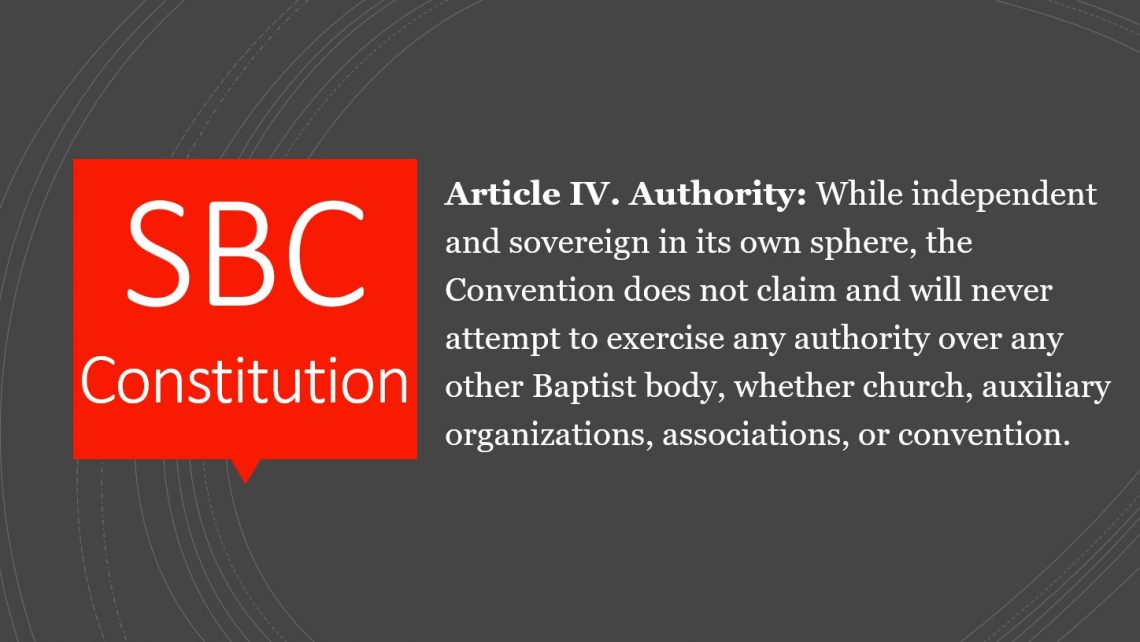I just read a helpful thread by Bart Barber, the President of the Southern Baptist Convention (SBC), about cooperation and non-connectionalism in Southern Baptist life. Among other things, he writes:
This local-church non-connectionalism simply says that two churches can do something together without taking on any responsibility before God for the other church…
This idea is woven into Article XIV (“Cooperation”) and Article XV (“The Christian and the Social Order”) of The Baptist Faith & Message. Those articles remind churches that it does not compromise a church’s faith to cooperate with other churches who differ theologically.
Quoting from the Baptist Faith & Message, he elaborates:
“Christian unity in the New Testament sense is spiritual harmony and voluntary cooperation for common ends by various groups of Christ’s people.”
“Cooperation is desirable…when such cooperation involves no violation of conscience or compromise of loyalty to Christ and His Word as revealed in the New Testament.”
Thus, so long as the ACTIVITIES do not violate conscience, the mere cooperation does not do so.
Let me say, first of all, that I agree with all of this. But as I was reading it, I also thought there might be one false implication worth warning against. This is not an implication that Bart embraces in his thread. It’s just one that some readers might be tempted to draw themselves. Here it is. While it is true that Southern Baptist churches in friendly cooperation may have many theological differences among them, it does not follow that all theological differences are therefore a matter of indifference to our cooperation.
Article 4 of the SBC Constitution has something profound to say about cooperation among our churches. Here it is:
While independent and sovereign in its own sphere, the Convention does not claim and will never attempt to exercise any authority over any other Baptist body, whether church, auxiliary organizations, associations, or convention.
There are two parts to this, and both are crucial. Let’s take the second part first. The second part guarantees the autonomy of local churches. The SBC does not have authority over any Baptist church (or any other church for that matter). Those churches really are independent and may run themselves how ever they see fit. Hopefully, they will order their congregations under Christ’s Lordship as revealed in Holy Scripture. But even if they do not, the SBC has no authority over those churches to make them do or believe anything.
If a Baptist church wishes to baptize babies, the SBC cannot stop them. If a Baptist church denies the Trinity, the SBC cannot stop them. If a Baptist church wishes to call female pastors, the SBC cannot stop them. If a Baptist church wishes to affirm so-called gay marriage, the SBC cannot stop them. Churches really are autonomous and have authority over their own affairs. The SBC has no official power over any congregation, for better or for worse.
The SBC does, however, have power to determine its own composition. And that brings us to the first part of Article 4, which says that the SBC is “independent and sovereign in its own sphere.” Among other things, that means that the SBC as a convention gets to decide which churches can seat messengers at the annual convention and which churches cannot.
The Convention is composed of “messengers who are members of Baptist churches in cooperation with the Convention.” A church not in friendly cooperation with the SBC cannot seat messengers. What must a church do in order to be in “friendly cooperation” and thereby to seat messengers? Among other things, such a church must have “a faith and practice which closely identifies with the Convention’s adopted statement of faith.” Our statement of faith says that the office of pastor/elder/overseer is limited to men as qualified by Scripture.
The messengers of the SBC have the right to determine whether or not a church is living up to that standard. This is the right that the messengers exercised at our most recent convention in New Orleans, when messengers voted by overwhelming majorities to remove two churches for having female pastors. In doing so, the Convention demonstrated that it is “independent and sovereign in its own sphere” while not disturbing in any way whatsoever the autonomy of the churches we removed. Those churches have continued on with their female pastors, and there is literally nothing the SBC can do to stop them.
But why would the SBC take such a drastic action—to declare these churches not in friendly cooperation? Why didn’t messengers simply allow those two churches to seat their messengers? Why not continue friendly cooperation with churches we disagree with theologically? It was not because we wished to declare them not to be Christians or to be off into some unredeemable heresy. The question of female pastors is a second-order issue after all. Nor did we remove them because of a zero tolerance for theological difference. After all, we have many differences among us.
We removed them because we have agreed to have some parameters to our cooperation for missions and theological education. The convention has declared over and over for decades now that it believes that pastors should be men as qualified by Scripture. If we seat messengers from churches that defy that standard, we will eventually cease to be the convention that we are now. We will eventually become a convention that reverses itself on the question of female pastors. And messengers have indicated time and again that this is not a direction that they wish to go. Any Baptist church is free to go that way, but the SBC is also free not to follow them.
So yes, church autonomy is real. A Baptist church in South Carolina is not culpable for the errors of a cooperating Baptist church in Texas (or vice versa). Nor can either church exercise authority over the other. Nor can the SBC exercise authority over either church. Nevertheless, the SBC is “sovereign in its own sphere” and has every right—indeed the duty—to determine its own composition in line with its own stated principles. Those principles are outlined in the Baptist Faith & Message, which says—among other things—that only biblically qualified men can fill the office of pastor/elder/overseer.






